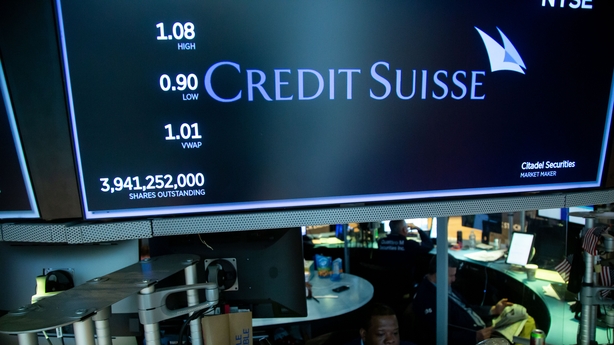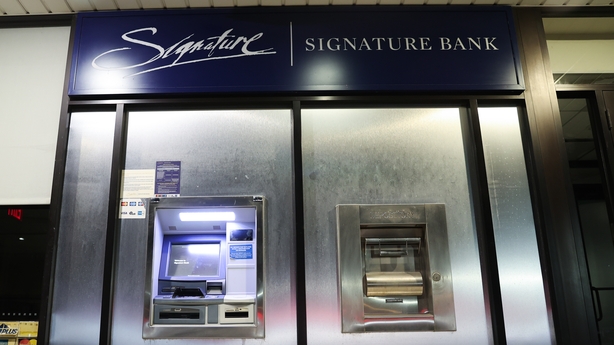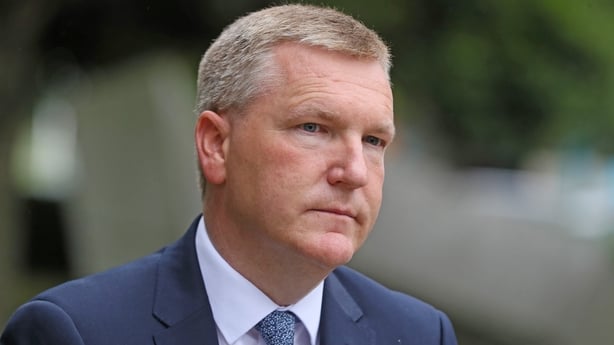As in politics, a week can be a long time in banking.
A little over seven days ago, all appeared well in the world of global finance.
But fast forward to today and a string of banks in the US have been rescued from the brink or closed their doors.
While here in Europe, in order to survive, one of the continent’s best-known lenders has been forced into a shotgun marriage with its nearest rival.
What happened at Credit Suisse?
The problems and scandals at Credit Suisse didn’t just arise this week, or even this year.
They date back to at least 2020, when CEO, Tidjane Thiam, was forced to quit after an investigation found the bank hired private detectives to spy on its former head of wealth management, Iqbal Kahn, after he left for arch-rival UBS.
In 2021 it took a reputational and financial hit after the Australia and UK based financial services firm Greensill Capital folded, leading the bank to freeze billions in investment funds.
Just weeks later it incurred losses of $5.5 billion when little known New York based hedge fund, Archegos Capital Management, collapsed.
Credit Suisse was also embroiled in a corruption scandal involving "tuna bonds" in Mozambique, which led to a fine of $475m.
In January last year, just eight months after he had been hired to come in and fix the bank, chairman Antonio Horta-Osorio resigned after it emerged he had breached Switzerland’s Covid-19 rules.

While a month later the bank was forced to deny allegations of wrongdoing after dozens of media published results of coordinated, Panama Papers-style investigations into a leak of data on thousands of customer accounts in previous decades.
In March 2022 of that year a Bermuda court ruled former Georgian Prime Minister, Bidzina Ivanishvili, and his family were due more than half a billion dollars in damages from Credit Suisse's local life insurance arm.
A litany of other subsequent scandals and regulatory problems continued to beset the company until the shift in sentiment towards banks caused by the Silicon Valley Bank collapse focused attention on it.
"This is more a crisis of confidence and trust."
After it emerged that it was haemorrhaging deposits and its largest backer, Saudi National Bank, said it could not provide any more financial assistance, Credit Suisse was forced to tap the Swiss central bank for $54 billion in liquidity last week.
But the game was up and by last weekend, it was staring into oblivion, forcing the Swiss authorities to manufacture a marriage of convenience with larger rival UBS for a little over $3 billion, a fraction of what it had been worth.
Does this mean other banks will follow suit?
That is a reasonable question, given the difficulties at Silicon Valley Bank, Signature Bank, First Republic Bank and now Credit Suisse.
The answer is not necessarily, but contagion can’t be ruled out.
Silicon Valley Bank collapsed because it had over-exposed itself to US Treasury bonds which lost value as interest rates rose strongly.
It then sought to raise funding after it sold some of those bonds at a loss, which in turn sparked a bank run that drained its deposits in a matter of days.
New York based cryptocurrency lender, Signature Bank, also failed last week after it limited crypto deposit balances in an attempt to increase its diversification.

But that move sent its share price plummeting and prompted a run, as depositors compared it to Silicon Valley Bank’s fate.
A week earlier another crypto focused bank, Silvergate, which had been struggling for months, also suffered a similar outcome.
While embattled San Francisco based lender, First Republic Bank, has been dealing with a crisis of confidence because many of its wealthy clients have deposits above the threshold for guarantee.
These clients are considered particularly volatile, willing and able to move their money at the drop of a hat to find higher yielding or less risky opportunities as interest rates rise.
Today its share price dropped by up to 50% at one stage, on reports that it could have to raise more money despite a $30bn rescue last week.
So while the effects of rising interest rates has been something of a common denominator, clearly each of the banks had its own specific issues that left them exposed.
That’s not to say there aren’t or won’t be others who will be left in a similar position when the tide goes out – in fact there may well be.
But right now, the problems don’t appear to be systemic in the same way that they were in 2008, at the start of the last crisis.
They are not about capital or credit quality.
Instead, this is more a crisis of confidence and trust.
What else is different to the crash of 2008?
For one, regulation has changed greatly since the last financial crash, and for good reason.
Rules are tighter, monitoring far more intrusive and intervention swifter when problems arise.
That doesn’t explain why various banks have been able to get into such difficulty over the past two weeks.
But at least the response has been decisive and fast.
In the US regulators moved in rapidly to deal with the situation at Silicon Valley Bank and the other lenders.
On this side of the Atlantic, the Swiss authorities effectively manufactured the tie-up between UBS and Credit Suisse.
Six major global central banks also came together last night to signal they would pump dollar liquidity into the banking system.
Political leaders, central banks and regulators have also been quick to repeatedly emphasise the resilience and capital strength of banks across the EU, UK and US.
If regulators have been doing their jobs, then the problems that have come to the surface should not be system wide.
But if they haven’t, then further trouble lies ahead.

What about Irish banks – are they safe?
The Irish banks are in much better shape than they were in 2008.
Their loan portfolios are far less concentrated than they were during the Celtic Tiger when they were focused on property and development.
Unlike Silicon Valley Bank, their funding is extremely diversified, so they aren’t overly exposed to bonds or big depositors.
The Minister for Finance and the Taoiseach have said the Government is monitoring the evolving situation closely, but have repeatedly reassured people that Irish banks are solid and stable.
A subgroup of the Financial Stability Group has been set up to track what is happening and any implications for Ireland.
But the message from authorities is clearly that deposits in Irish banks are safe.
So are we worrying about nothing then?
For the moment, yes.
Although there is one potential fallout for Ireland from all this.
The reason Irish bank share prices have been falling for much of the last week is that all the nervousness is pushing funding costs up.
That in turn may lead to tightened lending standards, which could mean that lending into the economy will be curtailed.
By extension that could weigh further on economic growth.
Not what we need when rising interest rates are having the same effects.







